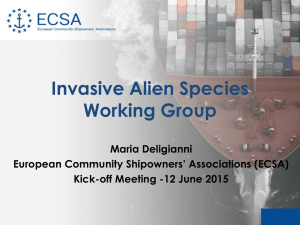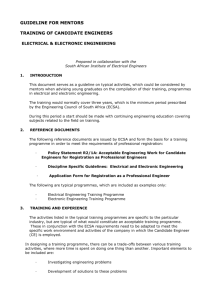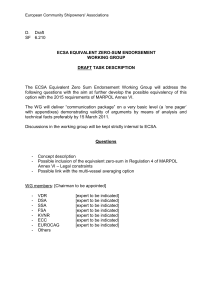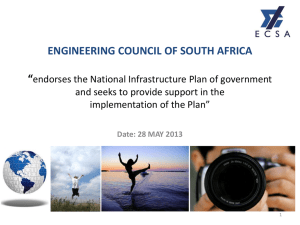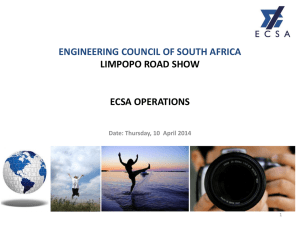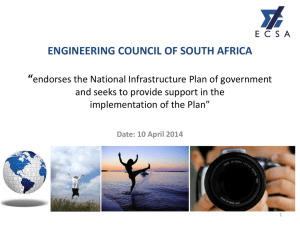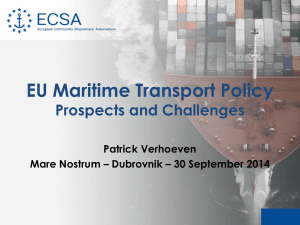no 12/7 (October 2012)
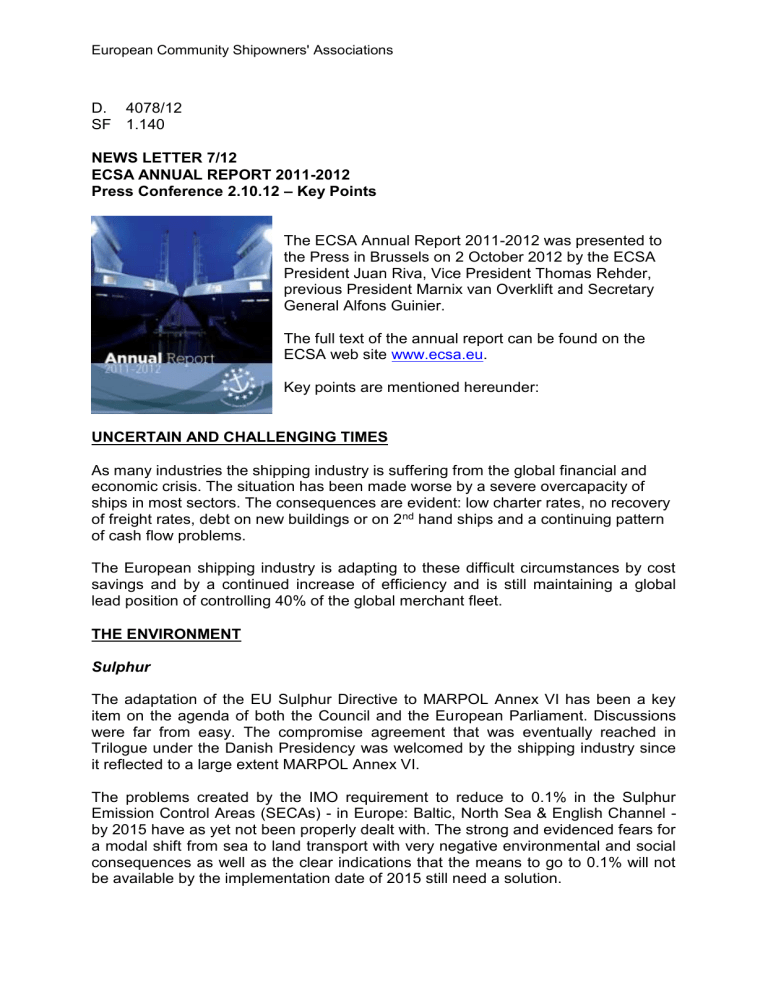
European Community Shipowners' Associations
D. 4078/12
SF 1.140
NEWS LETTER 7/12
ECSA ANNUAL REPORT 2011-2012
Press Conference 2.10.12
– Key Points
The ECSA Annual Report 2011-2012 was presented to the Press in Brussels on 2 October 2012 by the ECSA
President Juan Riva, Vice President Thomas Rehder, previous President Marnix van Overklift and Secretary
General Alfons Guinier.
The full text of the annual report can be found on the
ECSA web site www.ecsa.eu
.
Key points are mentioned hereunder:
UNCERTAIN AND CHALLENGING TIMES
As many industries the shipping industry is suffering from the global financial and economic crisis. The situation has been made worse by a severe overcapacity of ships in most sectors. The consequences are evident: low charter rates, no recovery of freight rates, debt on new buildings or on 2 nd hand ships and a continuing pattern of cash flow problems.
The European shipping industry is adapting to these difficult circumstances by cost savings and by a continued increase of efficiency and is still maintaining a global lead position of controlling 40% of the global merchant fleet.
THE ENVIRONMENT
Sulphur
The adaptation of the EU Sulphur Directive to MARPOL Annex VI has been a key item on the agenda of both the Council and the European Parliament. Discussions were far from easy. The compromise agreement that was eventually reached in
Trilogue under the Danish Presidency was welcomed by the shipping industry since it reflected to a large extent MARPOL Annex VI.
The problems created by the IMO requirement to reduce to 0.1% in the Sulphur
Emission Control Areas (SECAs) - in Europe: Baltic, North Sea & English Channel - by 2015 have as yet not been properly dealt with. The strong and evidenced fears for a modal shift from sea to land transport with very negative environmental and social consequences as well as the clear indications that the means to go to 0.1% will not be available by the implementation date of 2015 still need a solution.
European Community Shipowners' Associations
Inventive solutions to these problems have to be found in the IMO where the decision was taken. The possibility of exemptions as covered by the Trilogue agreement is further investigated.
The Commission’s toolbox on mitigation measures also needs to be refreshed offering more concrete value.
Climate Change
The shipping industry is and will continue to be a key environmentally friendly transport mode. On CO 2, shipping is by far the best environmental performer of all transport modes. Shipping produces only 2 to 3 % of the global CO 2 notwithstanding the fact that 90 % of global trade is transported by ship. The IMO energy reduction decisions (EEDI/SEEMP), together with specific measures taken by shipowners, will result in further CO 2 emission reductions of 50 % by 2050.
ECSA wishes to reiterate that any further decisions on Climate Change for shipping should be left to the IMO. Shipping being a de facto global business cannot work with regional measures. Moreover regional measures would have the opposite effect of what some expect from it. Multilateral approaches leading to global decisions in the
IMO are helpful and supported.
The Port Reception Facilities Directive
The ECSA contribution in response to the consultation process on the revision of the
Port Reception Facilities Directive reiterated key problems based on experiences of shipping companies in delivering waste ashore such as: the availability and adequacy of EU Port Reception Facilities, the obligation to deliver, the cost recovery system and exemption for regular services regarding the delivery of ship-generated waste as well as practical issues regarding the delivery of cargo residues.
A Commission proposal is expected to be released by end 2012. It could take the form of Guidelines or an amendment to the existing Directive. ECSA looks forward to a constructive dialogue towards concrete solutions.
Ship Recycling
ECSA very much appreciates that the Commission proposal for a new Regulation on
Ship Recycling accepts that the IMO Hong Kong Convention (HKC) provides a solid regulatory framework. However, some elements proposed by the European
Commission go beyond the HKC: notably, the inventory list of hazardous materials, the preparation of the ship for recycling and the contract between the shipowner and the recycling facilities.
In the context of the discussions in Council and in the European Parliament, ECSA strongly supports the Hong Kong Convention’s main elements, some of which are already applied through voluntary measures by the shipping industry.
IMO Member States are encouraged to ratify the Convention as soon as possible. It is, therefore, essential that the EU Regulation reflects the IMO legislation without any
“adds-on”. Indeed, deviating from the HKC would seriously endanger the ratification process in particular by the countries directly involved.
2
European Community Shipowners' Associations
PIRACY AT SEA
Piracy at sea is regretfully a recurring item in our Annual Report.
ECSA appreciates the efforts of EU
NAVFOR in the piracy area in the
Indian Ocean and the extension of their mandate.
However, the limited resources at their disposal make it necessary for shipowners to engage private armed guards to protect the lives of our seafarers.
We noted that many Governments have recently adopted legislation allowing the use of private armed guards on board of ships under their Flag. We hope that others will follow soon. However, it should be realised that – though necessary now – the use of such guards is not a long term solution to the piracy problem.
ECSA also commends the European External Action Service (EEAS) for their ongoing work on maritime capacity building in Somalia and in the area. It is evident that the solution to the Piracy problem off the Coasts of Somalia lies for the longer term in solving the problems on the land.
As expressed in the 3 rd Resolution of the European Parliament it is the task of the
International Community to guarantee safe transport in international waters. ECSA therefore pleads that Governments continue contributing with resources to EU-
NAVFOR and to the EEAS initiatives.
A recurring theme in the piracy debate is the issue of ransoms and whether the latter should be prohibited. ECSA firmly believes that such ideas are founded on an erroneous and incomplete appraisal of the current situation. Were ransoms to be prohibited, shipowners would lose the only tool at their disposal allowing them to release the many seafarers currently held in Somalia. Focus should rather be on sustained and increased action on money laundering and the financial follows stemming from piracy.
3
European Community Shipowners' Associations
THE HUMAN ELEMENT
Minimum level of training of seafarers – MLC and Enforcement Directives
ECSA appreciates the agreement reached between the Council and the European
Parliament on amending the EU Directive on Minimum Training of seafarers bringing it in line with the Manila amendments to the STCW Convention. The agreement reflects the Manila amendments.
ECSA hopes that the same spirit will prevail during the discussions on the
Enforcement Directives of the Maritime Labour Convention (MLC) arriving at full compliance with the Convention
STCW recognition of the Philippines
ECSA is closely monitoring developments in the EU and in the Philippines on the
STCW recognition and it has asked the European Commission and EMSA to deal with it very carefully, whilst – at the same time – urging the Philippines to ensure that all remaining outstanding shortcomings are solved as well.
ECSA welcomed the official announcement from the Philippines at IMO STW 43 about the creation of a single Central Maritime Administration, becoming effective on
1 June 2012, and about the country’s efforts to apply a strict monitoring of the education, training and certification of maritime professionals in accordance with the
2010 Manila Amendments.
Schengen Visa for Seafarers
In a constructive meeting between the members of the dedicated working group
(Commission and Member States) and ECSA/ISF/ECC, a number of specific problems were identified following which scenarios were developed for a possible insertion in the Schengen Visa Handbook such as multiple visa for bona fide seafarers and 2 entry visa for first time applicants.
ECSA hopes that Member States will accept amending the Schengen Visa
Handbook with the scenarios that were developed so as to solve current Schengen
Visa problems for seafarers.
EU TRANSPORT POLICY
Global Operational Framework
The Commission White Paper on European Transport Policy lays the basis for a long term strategy. ECSA has welcomed the main principles laid down in this policy paper. The Commission has clearly recognised that shipping is a de facto global industry and that policy measures on all fronts should take this into account.
Moreover, as expressed in the 2009 Policy Paper on Maritime Transport, European shipping should maintain and enhance the global lead position that it has today. The structural framework of state aid guidelines should therefore be continued for a
4
European Community Shipowners' Associations longer period. ECSA hopes that the review process that is currently being undertaken will result in such a continuation under the same terms.
TEN-T
ECSA very much appreciates that more than 80 European ports are part of the core
European Transport Network (TEN-T). Indeed, efficient ports and hinterland connections should be key elements of a European transport structure. At the same time ports and port services should – as key nodal points – continue to improve their efficiency and adapt to up-to-date logistic thinking.
EU Port Policy
The initiative of Vice President Kallas to revive a European Port Policy is welcomed by the shipping industry. Specific attention should be given to further improving and modernising port services such as: stevedoring, pilotage and towage. These services should realise that they are key elements of a logistic chain. Pure inward thinking – as often happens today – will eventually be detrimental to the position of shipping in the logistic chain.
Alleviation of Red Tape
Another laudable initiative of Vice President Kallas is to tackle red tape which is still a burden for shipping services. The Blue Belt project is a point in case. Indeed, shipping services should also have the benefits of the internal market that all other transport modes enjoy.
We have noted that the Blue Belt project has already changed the thinking of customs and the relevant Commission services. We hope that eventually after many years of discussions we will have a breakthrough soonest and that the EU cargoes transported by sea can maintain this status throughout their intra EU services.
Customs procedures are not the only administrative burden on shipping. Unlike other transport modes many - sometimes questionable - administrative obligations are imposed on ships and their crews. ECSA hopes that this unacceptable position of placing unnecessary burdens on the crew of the ships will be solved under this
Commission. The e-maritime ideas will be helpful in this respect. On top of that unnecessary administration and paper work that ends in the waste basket anyway should be abandoned altogether.
EU COMPETITION RULES
Guidelines
ECSA has agreed with the Commission proposal to apply the General Competition
Guidelines both to liner shipping and tramp shipping. However, for tramp shipping,
ECSA has suggested inserting the definition of tramp shipping pools in the General
Competition Guidelines by means of a footnote or annex.
5
European Community Shipowners' Associations
P&I Club Case
ECSA welcomes the Commission decision to close the investigation in the P&I
Clubs Agreements. In bilateral talks of the shipping industry with the Commission services it has been stressed that the system of mutual third party liability insurance is necessary to provide the very high levels of insurance required under international liability conventions.
PASSENGER SAFETY DIRECTIVES
Following the unfortunate accident of the Costa Concordia on 13 January 2012, both the European Commission and the European Parliament stressed that the final results and analysis of the accident investigation should be awaited before deciding on the need for new EU legislation. Meanwhile, whilst the European Commission is continuing its ongoing work on the review of the EU Passenger Safety Directives, EU
Member States should properly implement and apply existing legislations, both international and European.
ECSA is directly following the on-going process in close cooperation with the
European Cruise Council (ECC) and Interferry Europe.
6
